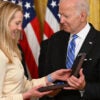In a historic move, all five justices of the Pennsylvania Supreme Court have voted to temporarily suspend the law license of the state’s attorney general, Kathleen Kane, based on the recommendation of the court’s 13-member disciplinary board.
This leaves the office of the state attorney general in limbo, since Pennsylvania’s constitution requires that the attorney general have a law license, and is prompting the state senate to research “a never used constitutional provision that allows a two-thirds vote of senators to remove” her from office.
The suspension stems from a grand jury investigation that resulted in Kane’s arrest in August on charges that she disclosed grand jury materials and then committed perjury by lying about it under oath.
According to the Philadelphia Inquirer, Kane is alleged to have leaked the material to a reporter at the Philadelphia Daily News in order to embarrass former state prosecutor Frank G. Fina, who had criticized Kane’s refusal to prosecute Democratic state legislators who were recorded on video and audiotapes taking bribes, including in exchange for voting against a voter ID bill.
According to prosecutors, Kane then ordered “aides to spy on the emails of people involved in the probe, including witnesses and the special prosecutor who was handling the case.” The subjects of the spying included former state supreme court Justice Ronald D. Castille, who authorized the leak investigation. Castille said that Kane had engaged in “outrageous conduct” that “offend[s] the legal system.”
Kane excused her refusal to prosecute the legislators by claiming that the undercover sting operation was “racist.”
A Philadelphia grand jury that investigated the legislative bribe case concluded, however, that Kane’s claim was “simply false” and that she had made “false” representations to the grand jury. In fact, the grand jury said that Kane failed “to examine a wealth of internal documents – documents created by and in the possession of the [Office of the Attorney General] – that contradicted” her public claims and a formal report made to the grand jury about the undercover sting investigation.
After Kane declined to proceed, the matter was taken up by Seth Williams, the Democratic district attorney of Philadelphia, who indicted Democratic state legislators for accepting bribes. These legislators, whom Kane refused to prosecute, admitted taking bribes before the local grand jury that Williams convened. Four have already been convicted and sentenced and two are still awaiting trial.
According to Fox News, Kane’s former lawyer actually admitted “that she had authorized the release of information related to a 2009 grand jury investigation” to the newspaper. However, her new attorneys are claiming that was incorrect and that Kane did not disclose grand jury material.
What appears clear from William’s successful prosecutions is that Kane’s justification for ending the bribery investigation was false.
Leaking information to criticize critics and not prosecuting clear instances of public corruption are unacceptable behavior for an attorney general.
The temporary suspension of Kane’s law license is just the first step in what Pennsylvania needs to do to fix this problem.
The Commonwealth and the citizens of Pennsylvania need an attorney general who conforms to the highest ethical and professional standards. Right now, they do not have such an attorney general.



























